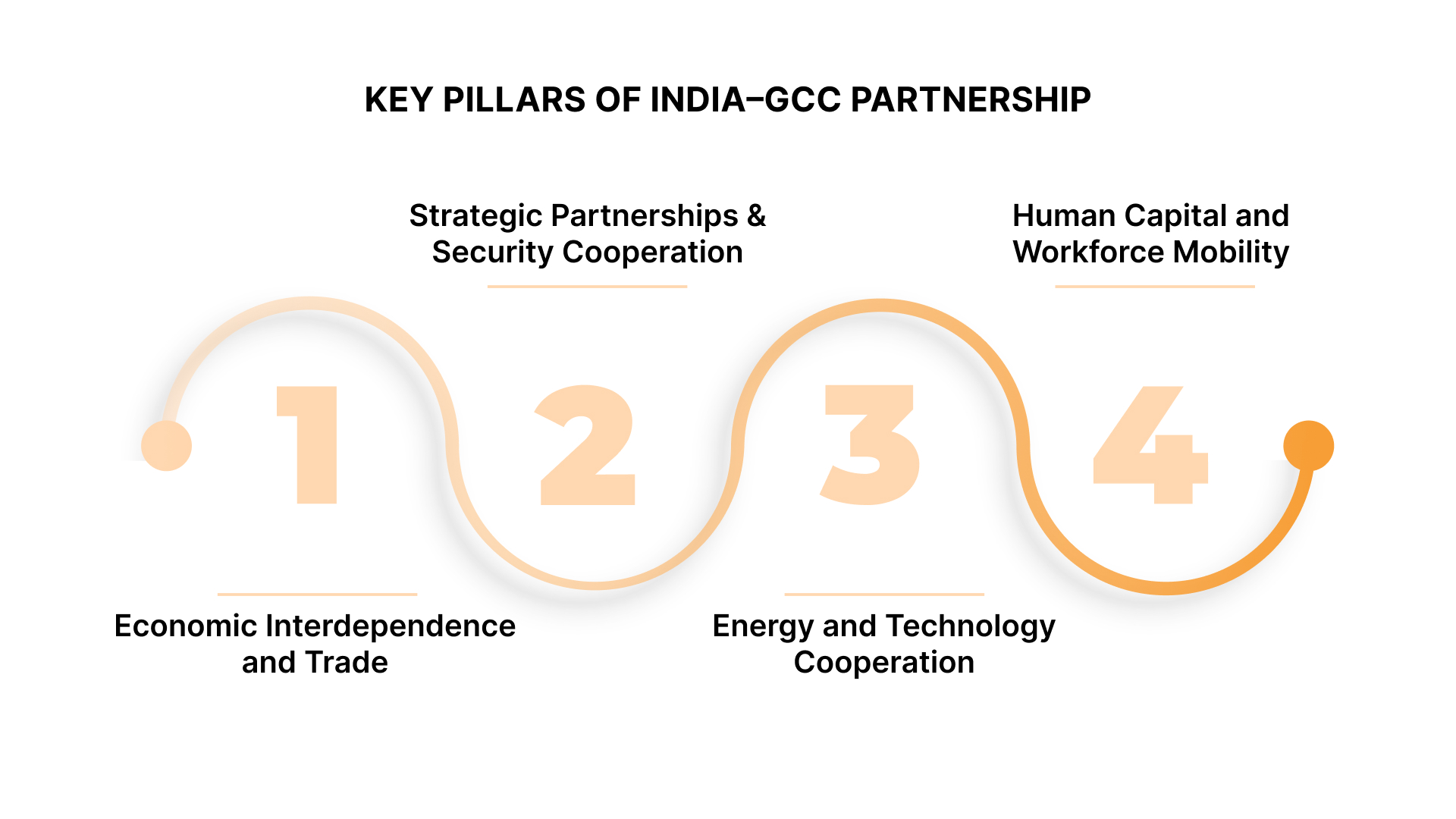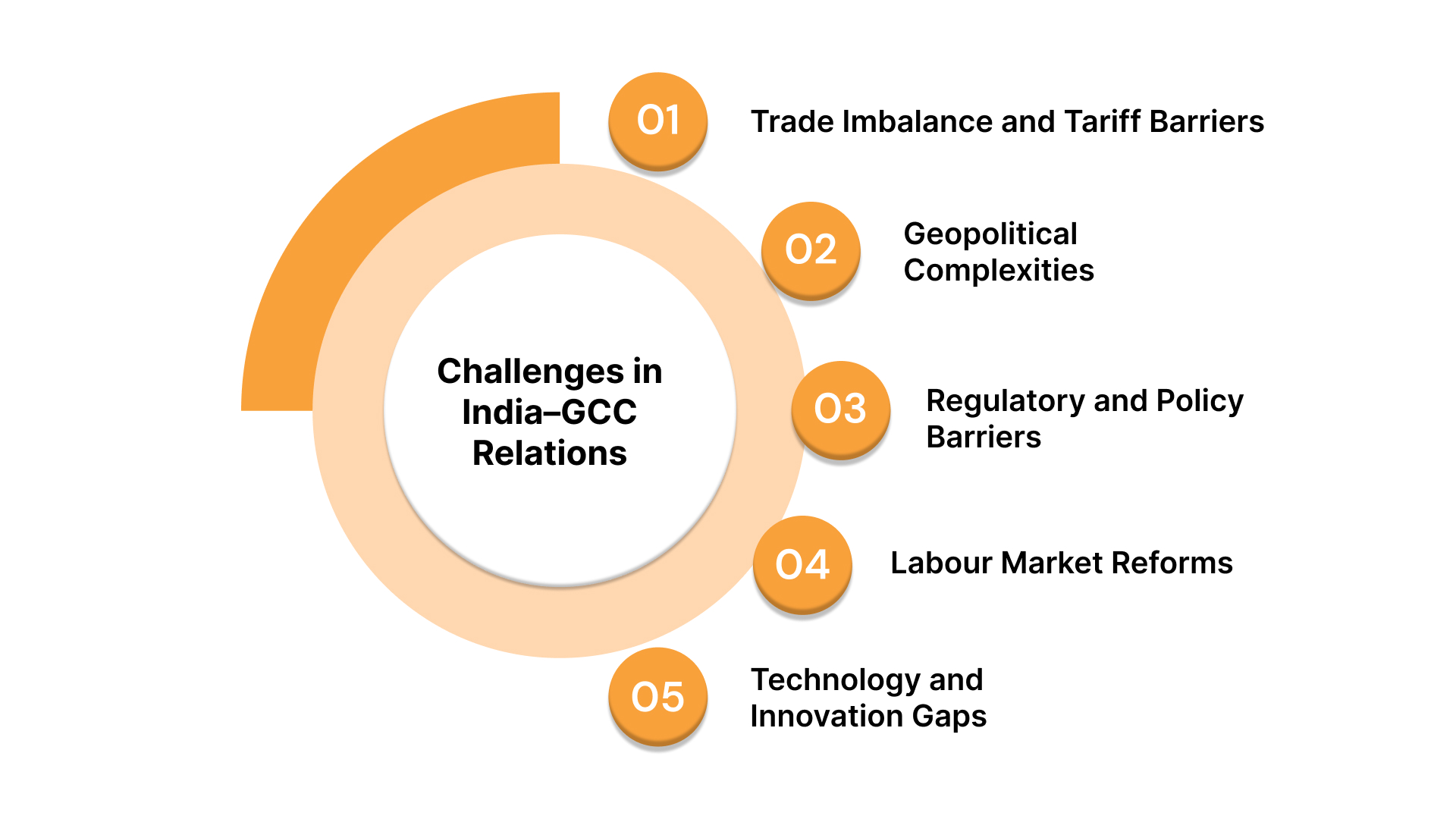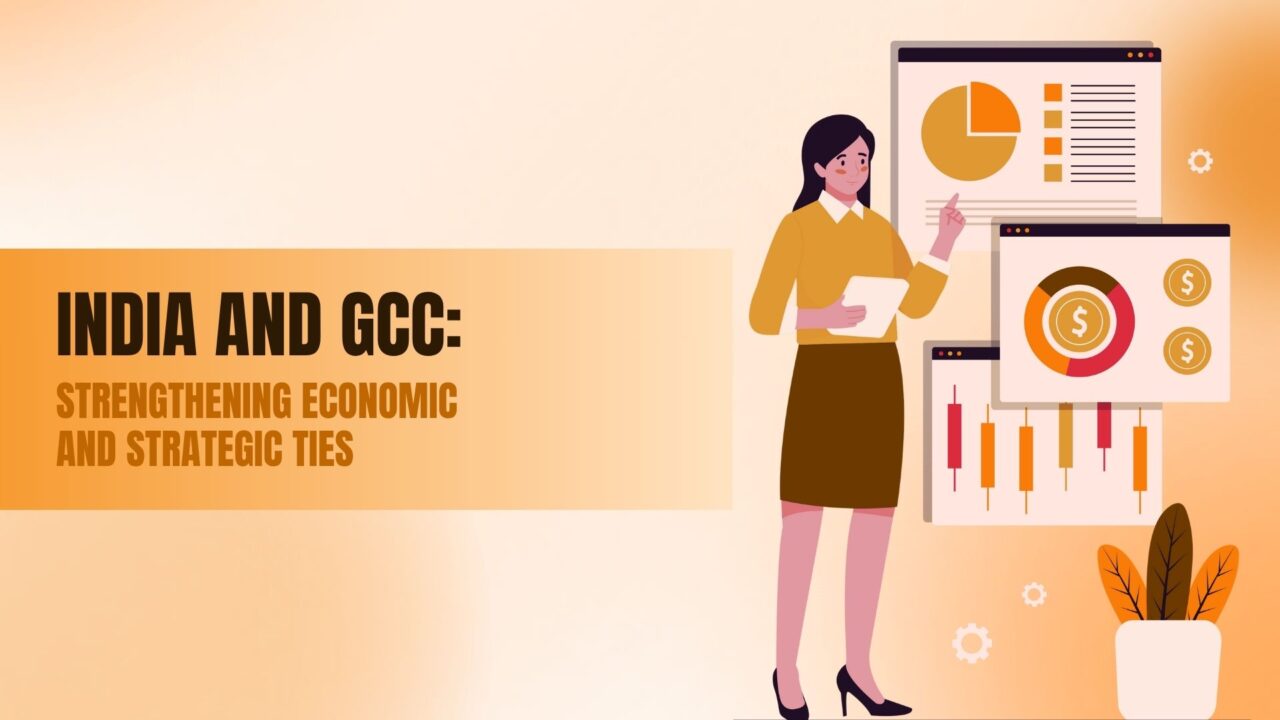India and GCC ties have deep historical roots and, in recent years, have grown into one of the most significant economic and strategic partnerships of the 21st century. The connection between the two regions goes beyond trade agreements; it reflects shared interests, geographical proximity, and mutual trust.
For India, the GCC is not only a key trading partner but also a strategic ally that strengthens energy resilience, advances security cooperation, and boosts workforce mobility. At the same time, millions of Indian professionals and skilled workers play a key role in driving GCC economies, further reinforcing the human and cultural bridge between the two regions.
In FY 2024–25, India–GCC bilateral trade accounted for 15.42% of India’s total global trade, highlighting the scale and depth of their partnership. This growing partnership is reshaping Asia’s economic landscape, driving new opportunities for businesses and professionals in both regions.
In a nutshell:
- India and the GCC share a historic partnership that has evolved into a major economic and strategic alliance shaping Asia’s future.
- The partnership covers energy, trade, defence, technology, and workforce mobility, fostering mutual growth and regional stability.
- Initiatives such as CEPA, Vision 2030, and IMEC are strengthening collaboration in innovation, infrastructure, and sustainable development.
- While challenges around trade balance and regulatory differences persist, both regions are actively working to strengthen ties through shared goals and talent exchange.
What is the Gulf Cooperation Council (GCC)?
The GCC, established in 1981, is a regional political and economic alliance comprising six Middle Eastern nations: Saudi Arabia, the UAE, Qatar, Kuwait, Bahrain, and Oman. It serves as a platform to coordinate trade, security, and regional policy, making it one of the most influential blocs in the global economy.
Here’s why the GCC continues to be a cornerstone of India’s external engagement:
- A vital energy partner: The GCC collectively contributes nearly a quarter of global oil production, supporting India’s energy security. Over 35% of India’s crude oil imports and 70% of gas supplies originate from this region.
- Trade and Investment Gateway: The GCC is India’s largest regional trading partner, with bilateral trade exceeding $178.56 billion in 2024–25. The UAE and Saudi Arabia rank among India’s top five global trade partners.
- Remittance and Workforce Link: Over 9 million Indians live and work in the GCC, sending home around $40 billion annually. This strong diaspora reinforces people-to-people connections and supports India’s economy.
- Geopolitical Importance: The GCC’s proximity to India’s western coastline strengthens maritime security cooperation, safeguarding vital trade routes, energy supplies, and regional stability.
- Future Collaborations: As the GCC diversifies under “Vision 2030” frameworks, India’s expertise in IT, renewable energy, and digital infrastructure offers new avenues for mutual growth.
Historical Context of India–GCC Relations
India’s relationship with the Gulf region is centuries old, rooted in trade, culture, and shared prosperity. From the maritime trade routes of ancient times to modern diplomatic engagement, the connection has continually evolved to reflect changing global dynamics and shared interests.
Key Milestones:
- Ancient Maritime Trade: The exchange of spices, textiles, and pearls between India’s western coast (Gujarat, Kerala, and Tamil Nadu) and Arabian ports created an early pattern of interdependence. It laid the foundation for long-standing cultural and economic ties.
- Post-Independence Diplomacy: India established formal relations with Gulf nations soon after 1947, focusing on expanding trade and political cooperation.
- 1970s Oil Boom: A surge in Gulf oil revenues led to a large-scale migration of Indian workers, strengthening both economic and social links.
- 2000s Look West Policy: India formalised its engagement with the GCC, prioritising energy security, investment, and workforce mobility.
- Recent Strategic Shift: Over the past decade, high-level visits, defence cooperation, and technology partnerships have transformed the relationship into a multifaceted strategic alliance.
Together, these milestones illustrate how India–GCC relations have evolved from historical trade links to a comprehensive modern partnership built on mutual interests and regional collaboration.
Also Read: GCC Growth in India: Key Drivers and Talent Impact
Key Pillars of India–GCC Partnership

The strength of India–GCC relations comes from its multidimensional nature. The partnership is built on economic, energy, strategic, and human capital linkages that collectively shape a sustainable and forward-looking alliance.
Here, we’ll explore the main dimensions of the India and GCC partnership, highlighting how Indian business hubs and staffing strategies actively engage in this evolving relationship.
1. Economic Interdependence and Trade
India and the GCC share a deeply intertwined economic relationship. The GCC has emerged as India’s largest regional trading partner, representing nearly one-fifth of its global trade. This interdependence has evolved beyond energy to include manufacturing, services, and investment linkages.
Expanding Bilateral Trade
Trade between India and GCC nations continues to grow rapidly. The UAE and Saudi Arabia remain key destinations for Indian exports such as precious metals, machinery, food products, and pharmaceuticals. Meanwhile, India imports petroleum, petrochemicals, and fertilisers from the Gulf, ensuring energy reliability and industrial growth.
Investment and Joint Ventures
Investment ties continue to gain momentum in sectors like infrastructure, logistics, and renewable energy. GCC sovereign wealth funds are investing actively in India’s highways, ports, and renewable projects, while Indian companies expand their footprint in the Gulf through strategic partnerships and joint ventures.
Trade Agreements and Policy Frameworks
The India–UAE Comprehensive Economic Partnership Agreement (CEPA), signed in 2022, sets a new benchmark for bilateral cooperation. It simplifies customs processes, broadens market access, and strengthens investment flows. Discussions for similar agreements with Saudi Arabia, Qatar, and Oman reflect a growing institutionalisation of trade frameworks.
2. Strategic Partnerships and Security Cooperation
As global power dynamics shift, India and the GCC are strengthening their strategic engagement. The cooperation now covers defence, intelligence sharing, and maritime security, key to maintaining regional stability and safeguarding trade routes.
Maritime and Defence Collaboration
India’s position along major sea lanes makes it a vital partner in protecting maritime routes that carry GCC oil exports. Joint naval exercises with the UAE, Oman, and Saudi Arabia boost coordination and reinforce collective maritime security.
Counterterrorism and Intelligence Sharing
Both India and the GCC have a shared interest in combating extremism and ensuring security across borders. Enhanced intelligence cooperation and high-level security dialogues have strengthened counterterrorism efforts and improved early warning systems.
Emerging Strategic Frameworks
India’s participation in initiatives such as I2U2 (India, Israel, the UAE, and the US) highlights its growing strategic influence in the Gulf. These frameworks encourage collaboration in clean energy, food security, and infrastructure, reinforcing regional stability through shared diplomacy.
3. Energy and Technology Cooperation
Energy forms the historical foundation of the India–GCC partnership, but technological collaboration is increasingly defining its future. Both regions are now engaging in initiatives that support global energy transitions and digital transformation.
Renewable Energy Collaboration
The GCC continues to meet more than half of India’s crude oil and natural gas requirements. Long-term energy contracts with countries such as Saudi Arabia, Qatar, and Kuwait help secure India’s energy supply and offer predictable revenue for GCC exporters.
Technology and Digital Innovation
The GCC’s rapid digital transformation creates new avenues for collaboration in IT, artificial intelligence, and fintech. Indian cities such as Hyderabad, Bengaluru, and Pune provide globally recognised tech expertise that supports GCC smart city and e-governance projects.
Research and Innovation Exchange
Joint research programmes and technology incubators continue to drive innovation-led growth. GCC investments in Indian technology start-ups and India’s support for knowledge-sharing initiatives showcase a forward-looking partnership focused on innovation and shared progress.
4. Human Capital and Workforce Mobility
People-to-people engagement remains the emotional and economic foundation of India–GCC relations. The Indian workforce is deeply embedded in the Gulf’s social and economic fabric, driving development and strengthening cultural ties.
Indian Workforce Contribution
Indian professionals, skilled workers, and entrepreneurs play a central role in shaping GCC economies. Their work ethic and expertise make them indispensable to national transformation initiatives such as Saudi Vision 2030 and UAE Centennial 2071.
Skilling and Mobility Partnerships
The growing demand for skilled labour in GCC nations is fostering collaboration in education, training, and certification. India’s initiatives to align vocational training with international standards are enhancing job readiness and employability for Gulf-based roles.
The Role of Workforce Partners
Recruitment and staffing agencies such as V3 Staffing play a crucial role in linking Indian professionals with GCC opportunities. With operational hubs in Delhi NCR, Mumbai, Chennai, Hyderabad, Bengaluru, and Pune, V3 Staffing delivers compliant, SLA-driven, and scalable hiring solutions for organisations operating in India and the GCC.
These pillars serve as the foundation of a partnership that continues to evolve with global shifts, while driving growth for both regions.
Also Read: How GCC Works: A Strategic Guide for Indian Enterprises
Challenges in India–GCC Relations

Despite strong cooperation, a few challenges continue to shape the dynamics between India and GCC nations. Understanding these hurdles is essential for both sides to design sustainable and mutually beneficial policies.
Some of the key challenges include:
- Trade Imbalance and Tariff Barriers: India’s exports to GCC markets remain focused on a few sectors, while heavy reliance on energy imports widens the trade imbalance. Both sides need to diversify trade to restore balance.
- Geopolitical Complexities: The GCC’s internal differences and broader regional tensions sometimes affect policy alignment, requiring India to stay diplomatically agile to preserve neutrality and stability.
- Regulatory and Policy Barriers: Varying investment laws, visa regulations, and compliance standards across GCC nations often complicate market entry and labour mobility for Indian businesses and professionals.
- Labour Market Reforms: Changes in Gulf labour policies, such as nationalisation drives, can impact employment opportunities for the large Indian diaspora. This makes skill upgradation and government-led labour agreements even more important.
- Technology and Innovation Gaps: While collaboration in renewable energy and digital transformation continues to grow, differences in R&D infrastructure and technology adoption still limit deeper partnerships in emerging sectors.
Addressing these challenges requires consistent engagement, clear policy frameworks, and joint efforts from governments and the private sector.
Future of India–GCC Relations
Looking ahead, the India and GCC partnership is set to grow stronger and evolve further, offering significant opportunities for Indian businesses and recruitment partners.
Key trends to watch include:
- Expansion of trade corridors and logistics connectivity: The India–Middle East–Europe Economic Corridor (IMEC) will enhance trade efficiency, open new supply chain pathways, and strengthen India’s export competitiveness across global markets.
- Technology and Innovation Partnerships: Collaboration in AI, fintech, and smart manufacturing is expected to accelerate, supported by India’s expanding tech talent base and the GCC’s growing digital investments. Joint innovation hubs in Bengaluru, Dubai, and Riyadh could shape the next growth frontier.
- Shared Focus on Sustainable Development: Both regions continue prioritising low-carbon growth, smart agriculture, and water conservation. Collaborative R&D initiatives and joint sustainability funds can deliver long-term benefits in food and energy security.
- People and Talent Exchange: Workforce mobility remains a key focus, with an increasing emphasis on skilled employment and professional services. V3 Staffing continues playing an essential role by connecting Indian professionals with strategic GCC roles..
- Investment in Infrastructure and Start-ups: Sovereign wealth funds from the GCC are steadily increasing investments in Indian infrastructure, logistics, and technology start-ups.This rising investor confidence enhances India’s economic resilience and drives innovation-led growth across key urban hubs, including Mumbai, Delhi NCR, and Chennai.
How V3 Staffing Supports India–GCC Collaboration in the Modern Economy?
V3 Staffing connects India’s top talent with opportunities across GCC markets through specialised recruitment and workforce solutions. With strong delivery hubs in Hyderabad, Bengaluru, Chennai, Pune, Delhi NCR, and Mumbai, the company supports both Indian and international firms expanding across these regions.
Here’s how we can help you:
- Permanent Recruitment: Delivers full-time hiring across industries, matching skilled professionals to roles in India and GCC-linked operations for sustainable business growth.
- Temporary & Contract Staffing: Offers flexible, compliant staffing for project-based or short-term needs, helping businesses maintain agility during peak or expansion phases.
- IT Staffing: Provides access to top technology talent in cloud, data, and software roles across India’s tech hubs, supporting innovation-led GCC partnerships.
- Recruitment Process Outsourcing (RPO): Manages end-to-end hiring with scalable RPO solutions, enabling companies to improve speed and precision in cross-market recruitment.
- Executive Search: Conducts targeted leadership hiring for senior roles, identifying cross-border leaders who understand both Indian and GCC business cultures.
V3 Staffing’s India-based delivery model and strong regional presence make it a trusted recruitment partner for businesses operating across both domestic and international markets.
Conclusion
India and the GCC share a relationship that continues to deepen across trade, technology, energy, and human capital. From historic maritime connections to modern-day strategic partnerships, the collaboration has evolved into a multidimensional alliance that shapes economic resilience and regional stability.
For organisations looking to capitalise on this trend, partnering with a recruitment firm that understands both the Indian talent ecosystem and Gulf-India dynamics is crucial. V3 Staffing brings this understanding, enabling you to access suitable talent, scale operations across geographies and meet your recruitment SLAs with confidence.
Contact us today to discuss your hiring needs and explore how our workforce solutions can support your growth strategy.
FAQs
Q. What are the key factors driving the economic partnership between India and the GCC nations?
A. The India–GCC partnership is driven by strong energy ties, increasing trade volumes, strategic geographical proximity, and mutual investments in infrastructure, technology, and renewable energy. Shared goals for economic diversification and regional stability further strengthen this collaboration.
Q. Which sectors present the greatest opportunities for India–GCC collaboration?
A. Key growth sectors include energy, infrastructure, renewable power, healthcare, fintech, food security, and digital technology. Both regions are also exploring partnerships in manufacturing, logistics, and education to support long-term economic diversification goals.
Q. What steps are being taken to boost investment flows between India and GCC countries?
A. India and GCC nations are strengthening investment flows through bilateral agreements, sovereign wealth fund collaborations, and joint ventures in infrastructure, technology, and energy. Reforms in India’s FDI policies and digital trade initiatives also make cross-border investments more seamless.
Q. What trade agreements or frameworks currently govern India–GCC relations?
A. India and the GCC operate under a framework of cooperation established in 2004, with negotiations underway for a Free Trade Agreement (FTA). Additionally, bilateral investment treaties and strategic dialogues with individual GCC nations support ongoing trade and economic collaboration.
Q. What role do remittances from the Gulf region play in India’s economy?
A. Remittances from the Gulf significantly boost India’s foreign exchange reserves and rural household income. They support domestic consumption, reduce poverty, and contribute to financial stability, especially in states with a large expatriate workforce like Kerala and Telangana.




